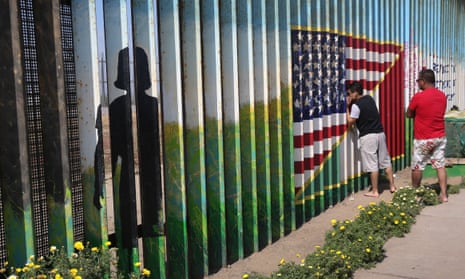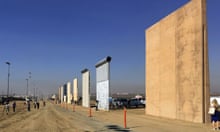US Border Patrol is restricting access to a park on the California-Mexico border where families separated by immigration laws frequently visit each other, sparking outrage from human rights advocates.
At Friendship Park, which extends from San Diego to Tijuana, US authorities are now limiting meetings to 30 minutes and allowing only 10 people at a time, a major policy change that dismantles what is for many families the only opportunity to spend time with their loved ones in person.
The news came a month after Border Patrol cancelled “Door of Hope” events where officials opened a gate at the park so parents and children divided by the border could hug for a few minutes, fueling criticisms that authorities were adopting cruel policies that serve no public safety purpose.
“It’s outrageous. There are families that come from really far away in the US and Mexico to visit loved ones,” said Enrique Morones, founder of Border Angels, an immigrant rights group. “It’s a shame what is taking place. A lot of this has to do with the message of hate that Donald Trump continues to scream out.”
A Border Patrol spokesman declined to say why the agency changed the visitation policy. In addition to time limits, the agency said that it was also restricting photography, unless approved by an agent, and that it was entirely cutting off access to the park’s bi-national garden.
The hours – Saturdays and Sundays from 10am to 2pm – have not changed, but previously families could spend the entire time there and wouldn’t have to wait in line for just 10 spots.
“This makes it very difficult,” said Morones, who witnessed the policy in action on a recent visit when he encountered a man crying while leaving. Morones said the man said he was told his 30 minutes were up and that he couldn’t stay even if there was space.
A patrol spokesman said people would not be forced to leave if there were fewer than 10 people in the area and that they could return if a spot opens up.
Even before the policy change, Friendship Park meetings were strained and often emotionally charged, with immigrants who aren’t able to cross the border forced to talk to loved ones through a metal fence. Sometimes relatives see children they’ve never met or parents reunite with children after years apart. Moreno said he has helped terminally ill people say goodbye to family on the other side.
In 2013, Morones convinced Border Patrol to allow a ceremony at Friendship Park where the doors opened for a few minutes and approved families were allowed to embrace. His group has done six of those events total, but Border Patrol said this year it would no longer be opening the fence, with Rodney Scott, new chief of the San Diego sector, calling it a “maintenance gate” and saying it would now be “used for maintenance purposes only”.
Morones had been working on an event where children with disabilities were going to unite with their parents in March.
“Having that human contact, allowing families to hug … it makes all the difference in the world.”
Jannet Fernandez, a California resident who regularly visits her Tijuana-based family at the park, criticized the new restrictions in an interview with the San Diego Union-Tribune, which first reported on the policy: “They’re treating us like we’re bad people. All we want to do is see our family.”
The Border Patrol agency has also recently come under fire for a report finding that agents routinely sabotaged water and other supplies left for migrants in the Arizona desert, condemning them to die of thirst.








